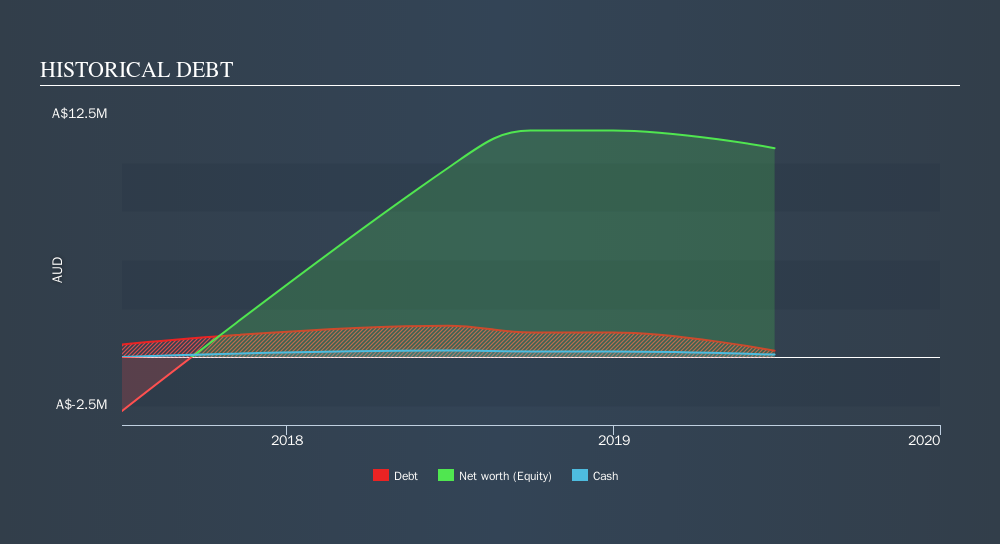
Howard Marks put it nicely when he said that, rather than worrying about share price volatility, 'The possibility of permanent loss is the risk I worry about... and every practical investor I know worries about. So it might be obvious that you need to consider debt, when you think about how risky any given stock is, because too much debt can sink a company. Importantly, iCollege Limited (ASX:ICT) does carry debt. But the real question is whether this debt is making the company risky.
When Is Debt Dangerous?
Debt is a tool to help businesses grow, but if a business is incapable of paying off its lenders, then it exists at their mercy. Part and parcel of capitalism is the process of 'creative destruction' where failed businesses are mercilessly liquidated by their bankers. However, a more common (but still painful) scenario is that it has to raise new equity capital at a low price, thus permanently diluting shareholders. By replacing dilution, though, debt can be an extremely good tool for businesses that need capital to invest in growth at high rates of return. When we examine debt levels, we first consider both cash and debt levels, together.
Check out our latest analysis for iCollege
How Much Debt Does iCollege Carry?
You can click the graphic below for the historical numbers, but it shows that iCollege had AU$325.6k of debt in June 2019, down from AU$1.62m, one year before. However, it does have AU$135.0k in cash offsetting this, leading to net debt of about AU$190.6k.

A Look At iCollege's Liabilities
Zooming in on the latest balance sheet data, we can see that iCollege had liabilities of AU$4.95m due within 12 months and liabilities of AU$3.96m due beyond that. Offsetting this, it had AU$135.0k in cash and AU$669.0k in receivables that were due within 12 months. So its liabilities total AU$8.11m more than the combination of its cash and short-term receivables.
iCollege has a market capitalization of AU$30.5m, so it could very likely raise cash to ameliorate its balance sheet, if the need arose. But we definitely want to keep our eyes open to indications that its debt is bringing too much risk. But either way, iCollege has virtually no net debt, so it's fair to say it does not have a heavy debt load! There's no doubt that we learn most about debt from the balance sheet. But you can't view debt in total isolation; since iCollege will need earnings to service that debt. So when considering debt, it's definitely worth looking at the earnings trend. Click here for an interactive snapshot.
In the last year iCollege wasn't profitable at an EBIT level, but managed to grow its revenue by201%, to AU$8.2m. That's virtually the hole-in-one of revenue growth!
Caveat Emptor
While we can certainly savour iCollege's tasty revenue growth, its negative earnings before interest and tax (EBIT) leaves a bitter aftertaste. Indeed, it lost a very considerable AU$3.2m at the EBIT level. Considering that alongside the liabilities mentioned above does not give us much confidence that company should be using so much debt. So we think its balance sheet is a little strained, though not beyond repair. Another cause for caution is that is bled AU$1.5m in negative free cash flow over the last twelve months. So suffice it to say we do consider the stock to be risky. When I consider a company to be a bit risky, I think it is responsible to check out whether insiders have been reporting any share sales. Luckily, you can click here ito see our graphic depicting iCollege insider transactions.
When all is said and done, sometimes its easier to focus on companies that don't even need debt. Readers can access a list of growth stocks with zero net debt 100% free, right now.
We aim to bring you long-term focused research analysis driven by fundamental data. Note that our analysis may not factor in the latest price-sensitive company announcements or qualitative material.
If you spot an error that warrants correction, please contact the editor at editorial-team@simplywallst.com. This article by Simply Wall St is general in nature. It does not constitute a recommendation to buy or sell any stock, and does not take account of your objectives, or your financial situation. Simply Wall St has no position in the stocks mentioned. Thank you for reading.
About ASX:NXD
NextEd Group
Provides educational services in Australia, Europe, and South America.
Adequate balance sheet and fair value.
Market Insights
Community Narratives




